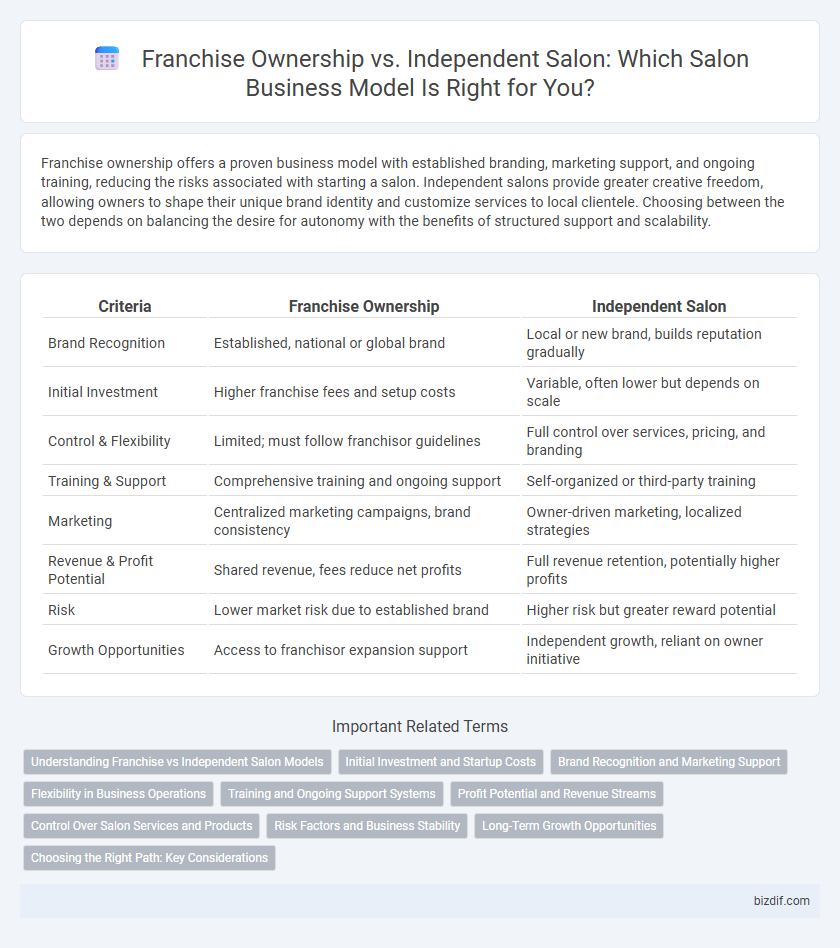Franchise ownership offers a proven business model with established branding, marketing support, and ongoing training, reducing the risks associated with starting a salon. Independent salons provide greater creative freedom, allowing owners to shape their unique brand identity and customize services to local clientele. Choosing between the two depends on balancing the desire for autonomy with the benefits of structured support and scalability.
Table of Comparison
| Criteria | Franchise Ownership | Independent Salon |
|---|---|---|
| Brand Recognition | Established, national or global brand | Local or new brand, builds reputation gradually |
| Initial Investment | Higher franchise fees and setup costs | Variable, often lower but depends on scale |
| Control & Flexibility | Limited; must follow franchisor guidelines | Full control over services, pricing, and branding |
| Training & Support | Comprehensive training and ongoing support | Self-organized or third-party training |
| Marketing | Centralized marketing campaigns, brand consistency | Owner-driven marketing, localized strategies |
| Revenue & Profit Potential | Shared revenue, fees reduce net profits | Full revenue retention, potentially higher profits |
| Risk | Lower market risk due to established brand | Higher risk but greater reward potential |
| Growth Opportunities | Access to franchisor expansion support | Independent growth, reliant on owner initiative |
Understanding Franchise vs Independent Salon Models
Franchise ownership in salons offers a proven business model with established brand recognition, marketing support, and operational guidelines, reducing startup risks and accelerating customer trust. Independent salons provide greater creative freedom and flexible decision-making, allowing owners to tailor services and brand identity uniquely to their target market. Understanding the trade-offs between franchise stability and independent innovation is crucial for prospective salon owners assessing long-term profitability and personal business goals.
Initial Investment and Startup Costs
Franchise ownership in the salon industry typically involves a higher initial investment, including franchise fees, mandatory branding, and marketing expenses, often ranging from $150,000 to $500,000. Independent salons offer more flexibility with startup costs, which can vary widely based on location, size, and equipment, generally starting from $50,000 but requiring strategic capital allocation for permits, interior design, and inventory. Choosing between franchise and independent ownership impacts financial planning, with franchises providing brand recognition and support while independents demand personalized budgeting and risk assessment.
Brand Recognition and Marketing Support
Franchise ownership offers strong brand recognition and comprehensive marketing support that can attract a steady flow of clients, leveraging established reputation and promotional strategies. Independent salons often face challenges in building brand awareness and managing marketing efforts but benefit from greater creative control and flexibility in targeting local markets. The decision between franchise and independent ownership hinges on prioritizing brand strength and marketing resources over personalized brand development and operational autonomy.
Flexibility in Business Operations
Franchise ownership offers structured business operations with established brand guidelines, limiting flexibility but providing proven systems and support. Independent salons enjoy greater autonomy, allowing tailored services, customized marketing, and adaptive scheduling to meet local client demands. Flexibility in business operations is higher in independent salons, enabling quicker responses to market trends and personalized customer experiences.
Training and Ongoing Support Systems
Franchise salon ownership offers structured training programs and ongoing support systems, ensuring consistent service quality and business operations across locations. Independent salons rely on self-directed training efforts, often customizing education to fit unique brand visions but facing challenges in accessing continuous professional development resources. Access to franchise-provided marketing, operational guidance, and product training enhances franchisees' ability to maintain competitive advantage and improve staff performance.
Profit Potential and Revenue Streams
Franchise ownership in the salon industry offers established brand recognition and proven revenue streams, often resulting in higher initial profit potential due to built-in customer bases and standardized marketing. Independent salons have greater flexibility to tailor services, pricing, and promotions, which can lead to diverse revenue streams such as exclusive product lines or unique service packages that enhance long-term profitability. Profit margins for independent salons vary widely based on management efficiency and local market demand, while franchise salons benefit from consistent support and operational frameworks that stabilize income.
Control Over Salon Services and Products
Franchise ownership offers structured guidelines for salon services and product selection, ensuring brand consistency but limiting customization options. Independent salons maintain full control over service menus and product offerings, enabling tailored customer experiences and unique brand identity. This autonomy allows independent owners to quickly adapt to market trends and client preferences without corporate restrictions.
Risk Factors and Business Stability
Franchise ownership offers reduced risk factors due to established brand recognition, proven business models, and ongoing corporate support, enhancing business stability for salon owners. Independent salons face higher risk levels from market competition and brand building but gain greater creative control and flexibility in service offerings. Financially, franchises benefit from shared marketing and bulk purchasing power, which can stabilize cash flow, whereas independent salons rely heavily on local client retention and individualized marketing strategies.
Long-Term Growth Opportunities
Franchise ownership in the salon industry offers structured brand recognition, proven business models, and access to corporate resources that can accelerate long-term growth and scalability. Independent salons benefit from complete creative control and flexibility in service offerings, allowing them to adapt quickly to local market demands and build unique customer loyalty. Choosing between franchise and independent salon ownership depends on balancing the trade-off between standardized growth support and personalized business innovation.
Choosing the Right Path: Key Considerations
Franchise ownership offers established brand recognition, standardized training, and marketing support, making it ideal for entrepreneurs seeking structured growth and reduced risk. Independent salons provide complete creative control, flexible business models, and the ability to build a unique local reputation, appealing to owners who prioritize personalization and autonomy. Evaluating factors such as initial investment, brand alignment, target market, and long-term goals is essential in choosing the right path between franchise and independent salon ownership.
Franchise Ownership vs Independent Salon Infographic

 bizdif.com
bizdif.com